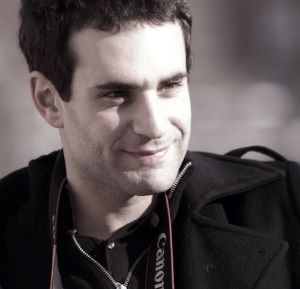Alumni Spotlight: Jimmy Keyrouz '16
The Alumni Spotlight is a place to hear from the School of the Arts alumni community about their journeys as artists and creators.

The Alumni Spotlight is a place to hear from the School of the Arts alumni community about their journeys as artists and creators.
Jimmy Keyrouz is a director/writer who recently graduated from Columbia University School of the Arts where his thesis film passed with honors. His latest film Nocturne In Black won the Gold Medal in the 43rd Student Academy Awards® and was part of Student Prints in the Telluride Film Festival. It also won Jury Selects at the Columbia University Film Festival the National Board of Review Student Grant, the Caucus Foundation Production Grant, the Marion Carter Green Award and the IFP Audience Award. It premiered at Lincoln Center in May 2016 and screened in many other film festivals around the world.
Jimmy completed his undergraduate studies in Filmmaking in 2009, and went on to direct short films and music videos for television. In 2012, Jimmy joined the Screenwriting/Directing Master of Fine Arts program at Columbia University, in New York City, where he enrolled in the Film Program's Directing/Screenwriting concentration. While in the program, Jimmy's course of study included directing, screenwriting, TV writing and directing actors classes. During his years at Columbia, Jimmy wrote two feature screenplays, a TV Pilot and directed three short films. He also served as teaching assistant where he taught directing and writing classes.
Jimmy is currently developing a one-hour TV drama and a feature screenplay. He also works as a freelance director in Los Angeles and New York.
Why did you make Nocturne in Black?
It all started when I read that in several areas that were controlled by terrorist organizations, daily activities that we take for granted such as smoking tobacco, modern dressing and especially music, have been banned and are punishable by death.
I think this is unconceivable and as a piano player myself, I deeply relate to that topic. Then a friend sent me an article with the title: "In Syria's starving Yarmuk camp, a young pianist conjures hope." And that's how everything started. I got in touch with Aeham Ahmad, the piano player in the article's picture and he told me about the hell in which he was living. I thanked him for being so inspiring. When the body is trapped, the mind can still go away. Aeham played to take people's minds off the blasts and bombs surrounding them but also to remind them that there are still beautiful things in life and music is one of them. When I told him about my project, he was really excited. That is when I started to write a screenplay inspired - not based on - Aeham's situation. I think art is a mighty tool that helps us fight extremism and terrorism; fighting for art and music especially in these areas of the world is crucial.
Was there a specific faculty member or peer that especially inspired you while at the School of the Arts? If so, who and how?
Among many great teachers and mentors, Eric Mendelsohn will always be among the ones that I'll remember the most. His passion and enthusiasm for films are highly contagious. His method of teaching directing and breaking down films shot by shot is incredibly effective!
How did attending the School of the Arts impact your work and career as an artist?
The M.F.A in Screenwriting/Directing at Columbia University School of the Arts had a huge impact on me as a filmmaker. I never had much experience writing but I always thought that being a better writer makes you a better storyteller and therefore a better filmmaker. And as a director, my approach while reading a screenplay changed since I learned how to write. The directing classes as well as shooting shorts and exercises for practice honed my directing skills. So the impact of the M.F.A program in Screenwriting/Directing at Columbia University School of the Arts was huge.
What were the most pressing social/political issues on the minds of the students when you were here?
Women and women in films.
What was your favorite or most memorable class while at the School of the Arts?
Directing I with Eric Mendelsohn.
What were the first steps you took after graduating?
I moved to LA to get a manager and network.
What advice would you give to recent graduates?
I believe the most important step after graduation is to have the next project ready or at least in development. Because even if you win the Oscar for your thesis, people will congratulate you and believe in you and your talent, sure, but the big question will be: What’s next for you? So it’s way better to have the next project - whether a feature-length script, a TV Pilot/Bible or else - ready.